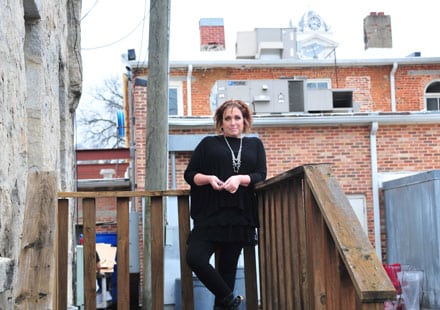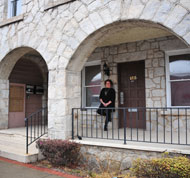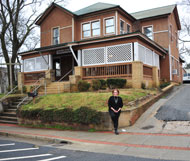
But acclaimed Gwinnett County author Carole Townsend stepped out of her comfort zone to write her fourth, and arguably most intriguing, book.
“Blood in the Soil,” scheduled to be released by Skyhorse Publishing on April 12, is an inside look into one of the most notorious crimes ever committed in Gwinnett, the shooting of Hustler Magazine publisher Larry Flynt in downtown Lawrenceville in 1978.
Townsend, whose previous three tomes – “Southern Fried White Trash,” “Red Lipstick and Clean Underwear” and “Magnolias, Sweet Tea, and Exhaust” — showcased her wit and humorous writing style in stories set in her beloved South, tackled a much more serious subject here.
But be forewarned: “Blood in the Soil” is not a book about Flynt, the flamboyant adult magazine publisher who was left paralyzed from the waist down by the shooting. Rather, it explores in meticulous detail the investigation into the shooting, led by Detective J. Michael Cowart, and the life and harrowing circumstances of the shooter and avowed racist, serial killer Joseph Paul Franklin, who was executed by lethal injection on November 20, 2013 at the Eastern Reception, Diagnostic and Correctional Center in Bonne Terre, MO, for the 1977 murder of Gerald Gordon outside a synagogue in St. Louis, MO.
Townsend sat down with the Gwinnett Citizen recently to discuss her book, the process of researching and writing it and what she hopes readers learn from it.

This is a big departure for me. I’m known for kind of goofy southern humor. The tie that binds is the fact that we are still in the South. And this book is very much a book about the angst of the South, certainly in the ‘60s, ’70s and even the ‘80s and beyond. So that is the similarity. I do love the South. I love writing about the South, because you never run out of material. It’s so weird, and quirky and beautiful and amazing here, so that is the similarity. I lived in Doraville and was 16 at the time that this happened, so I do remember thinking, “Larry Flynt?” I didn’t really know who he was, but I did know that he was someone that everybody was talking about. And why on earth Gwinnett County? I thought, what in the world is that guy doing in Gwinnett County? So that always stuck with me. So I decided to look into the story. I didn’t really know how it was resolved, and, being a journalist, you want to know. So I thought I could look into this. You know when a story is supposed to happen, because doors open. And the craziest doors opened – unfortunately for Franklin – about two months after I started looking in this, he was executed. Because he was in the news again, I thought, “It never hurts to ask.”
I have to be honest with you, I never knew how (the case) turned out.
It was very quiet. Most people do not know that the case was solved and how it all shook out. Some fabulous investigators were tasked with figuring this case out. When Franklin started reaching out – he was bargaining, basically, to get out of what was at the time the highest security prison in the country, and he didn’t like it. So he started bargaining with information that he had with all of the jurisdictions that he had touched over the years, which as it turns out were many, many. He estimated 22 shootings, most of which resulted in killings and 16 major bank robberies. He had no ties to anyone, on purpose. So he could commit a crime here and turn up 500 miles away and nobody knew anything. He wasn’t leaving behind a family that was trying to explain where he was, he didn’t reach out for help to family members. He was a true lone wolf. A very scary man. Very scary. It was amazing that someone could operate for years as he did. He wasn’t on the FBI’s radar for this shooting or for most of the others, and he stayed just far enough below the radar that nobody paid attention to him.

Well, I certainly couldn’t look at this subject with humor. The challenge was stopping the research and starting the writing. I had to make myself stop because uncovering this little fact led to two more over here, which led to 10 more over there. Gwinnett County at that time was wide open. So much went on here that you just wouldn’t believe. It was crazy back in the ‘70s and ‘80s; it was kind of a free-for-all. But some real heroes emerged, not only out of this case but several other big ones as well. The lead investigator in this case, Michael Cowart, played “cops and robbers” (as he put it) before coming to Gwinnett and retired in his mid 40s from the U.S. Navy. I mean, the guy is no slouch.
To write a book like this, I would imagine you need some help. Who were some of the people who helped you along the way?
(Gwinnett County District Attorney) Danny Porter and his staff were very helpful; he granted me months of access to all the files, and he opened doors for me. Old-school police officers like Michael Cowart – if I would have called him out of the blue, he likely wouldn’t have given me the time of day. But since Danny Porter made the introduction, (Cowart) was so gracious. In 1978, Cowart was a detective and later became the spokesman. He was well educated and eloquent; so just to hear him tell these stories – and he spent hours with me in person, on the phone and by email – was amazing. And the Lawrenceville Police Department was very helpful to me while writing this book.
People at the Lawrenceville PD spent a great deal of time with me, and they gave me access to literally hundreds of photos from that time period. Captain Jeff Smith spent time with me as I examined dozens of photos, and he could name every single person in every one of them. He helped me understand the timeline from then (1978) to today, and he knew of the key players. That kind of help with research is what brings the facts of the case to life. That kind of help brings the characters and the scenes to life.
What did you learn about Gwinnett County while you were writing this book that you didn’t know before?
Oh gosh … I was not aware that well into the ‘80s, the Klan openly marched and demonstrated here. The Lawrenceville Police Department told me stories about the Klan calling them to say, “Look, we’re going to be marching, so we need you to look for these two guys and arrest them.” Once the men were arrested, then the KKK could challenge a court ruling or law. So they would coordinate these efforts and arrests. It was really bizarre, to me.
After writing this book, do you see yourself doing more of these types of books?
I really liked it, and my publisher sure would like to see me do more of these. I don’t know. I have a few things in the hopper for the next one – the publicity for this one is just starting to ramp up, so that will take about three months, so I have a little bit of time to decide. But I will tell you that I enjoyed it immensely. The research – I’m a research person anyway – and the putting together of this story was really fun. This could have panned out to be really boring, rubber-stamp, case closed thing, but it didn’t. So the story can start out, “Oh, ho-hum, let’s get it out of the way,” or it can turn out like this one. I mean, the police reports were page-turners, so you know there was something interesting there. But to answer your question, I don’t know. My publisher would be very happy for me to do another, because the interest in something like this breaks out of the southern region into the national spotlight, so there’s that dynamic. But we’ll see.
How long did it take you to write it?
Actually, pen to paper about three months. It took me a little bit longer to research it than to write it because once you have all of that information – I’m horribly unorganized but I had to make myself be organized. I mean, I purchased an accordion folder for the first time in my life, because there was so much and you do not want to get your wires crossed or your facts crossed up. But once you have all of that and you do start actually writing, it’s like you can’t stop. It just flows and flows and hopefully you just keep going.
What do you hope that the reader gets out of this book?
Hmm, I don’t know if I can answer that one very easily. I’m a firm believer that if we rewrite history or paint over it to make it look a little prettier than it really was, we run a very real risk of repeating it. I love the South. I was born and raised here, but we have a couple of big, fat black eyes, and the people like Joseph Paul Franklin are the result. I think if we try and rewrite that or we sweep it under the rug as if it never happened, then we run the very real risk of having history repeat itself. Especially today. I mean, if you turn on the news today, all you hear are wicked attempts at racial division because we want to win the election. It’s a lucrative industry in a lot of ways. And if we forget how true evil – and Joseph Paul Franklin was pure evil and the principles that he believed in were pure evil – if we forget how they take root and fester and grow in the dark, there’s nothing to stop it from happening again. Unfortunately, I don’t think we’re that far from it now. You’ve got to have people out there who say, “Wait a minute, we did this before and look what happened.” Make no mistake, it’s not just a Southern problem, but we certainly have the reputation of owning it. I think it’s incumbent on us in the South to be at the forefront of not letting it happen again, and certainly not here.
Did you try to make contact with Larry Flynt?
I did. He is actually alive and well and sharp as a tack and running his huge enterprises out in Beverly Hills. I was routed to his attorney, who was very helpful and spent a lot of time with me talking about the book. Did I have a personal conversation with Flynt? No, I didn’t. But I felt like through his attorney, I was getting the next best thing. You know, I was very careful not to make this book about Larry Flynt because I did not want him to be the focus. What happened here was tragic and it certainly changed his life forever, but the book is about the investigation into the incident as well as the man who shot him and his ideologies and what he was trying to accomplish by committing the crimes that he did. I know, you say Larry Flynt, and peoples’ heads turn. But I did not want that to be the focus. I wanted it to be the back story.
What was the spark that hit you about writing this book?
For whatever reason – I can’t explain why – the fact that this happened here never left me. I mean, no one remembers much from where you were at 16, right? So I can’t explain that, but I know it’s always been there in the back of my mind. “Whatever happened with that?” I’m a true believer that if a story is meant to be told, the way is paved. I really believe that. So I was thinking about this, and I don’t know why. But lucky for me, and unlucky for (Franklin), his execution date came up and I thought, “OK, it’s in the news, people are going to have stuff out on it, it’s going to be relevant and people are going to be more apt to answer questions. That’s what made me say, “OK, let’s see what happens. The research could have gone nowhere, but I’m happy to say that the story was so fascinating, I had to write it.
I believe that we should drag parts of our history out into the sunlight every now and then and look at them, really examine them for what they are. Then hopefully, when we pack them away again, the memory is so vivid and terrifying that we dare not go down that same road, ever again.

